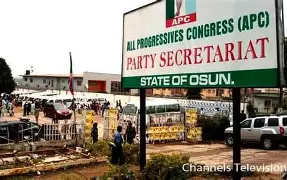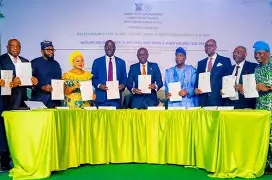Rainfall Triggers Severe Flooding in Lekki Phase 1

By Sulaimon Popoola
Lekki Phase 1, along the Lekki-Epe Expressway in Lagos, was thrown into distress on Monday after massive flooding left several homes submerged, roads impassable, and motorists stranded for hours.
Despite years of government promises, Lekki and its surrounding communities continue to suffer devastating floods whenever it rains.
Videos obtained by GovernMendNG showed cars struggling through knee-deep floodwaters, with some vehicles partially submerged. Businesses were also forced to shut down as floodwaters disrupted activities.
Video Credited: Reporter
The recurring problem has once again sparked calls for urgent and lasting solutions. Many fear that the situation will only worsen as the rainy season progresses.
In the comment section of one of the videos shared on Facebook, some users expressed their frustrations.
“Nothing special about Lekki,” wrote Tomosori John. “During the rainy season, water won’t let you rest, and in the dry season, offensive odour takes over everywhere.”
Another user, Kemi Osude, urged people to stop blocking natural waterways. “Let people stop building on water channels and dumping refuse in drainage,” she said.
Efforts to reach the Lagos State Commissioner for Environment and Water Resources, Tokunbo Wahab for comment were unsuccessful. However, just days earlier, on Friday, September 19, Wahab had announced the suspension of all reclamation projects across the state.
In a statement, the commissioner raised concerns over unregulated land reclamation activities, which he described as major contributors to flooding and environmental degradation.
He listed several affected areas, including Parkview, Banana Island, Osborne, Victoria Island Extension, Lekki, Ajah, Oworonshoki, Lagos Mainland, Ikorodu, Ojo, and Badagry.
According to Wahab, many of these projects were being carried out without proper Environmental Impact Assessments, EIA, or drainage clearance from the ministry.
“While reclamation may create space for housing and infrastructure, it also increases the risk of flooding, coastal erosion, destruction of livelihoods, especially fishing—loss of wetlands and biodiversity, and poor water quality,” Wahab said.
He stressed that Lagos, with its low-lying landscape and fragile ecosystem, cannot continue to tolerate indiscriminate reclamation that endangers residents.
The directive, which took immediate effect, requires that all ongoing and approved reclamation projects be submitted to the ministry for documentation and monitoring. New projects must undergo a full EIA and obtain official clearance.
Wahab warned that violators who fail to comply within seven days would face strict penalties, including site closures, removal of illegal sand fills, reopening of blocked water channels, and possible arrests and prosecution.







